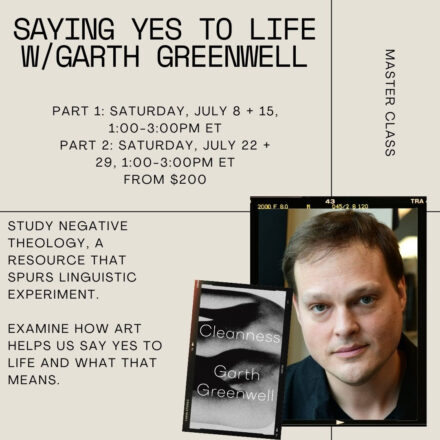This course has two parts. They are designed as a sequence, but can be taken separately. Each part separately is $200, both parts are $300.
Part 1: Saturday, July 8 + 15, 1:00-3:00pm ET
Part 2: Saturday, July 22 + 29, 1:00-3:00pm ET
Called a “stylist’s stylist” by the New Yorker, and winner of the Vursell Award for prose style from the American Academy of Arts and Letters, Garth Greenwell is the author of two internationally acclaimed works of fiction, What Belongs to You and Cleanness. He is also the co-editor, with R.O. Kwon, of the nationally bestselling anthology Kink. He has taught at the Iowa Writers’ Workshop and Princeton University, and beginning this fall will be a Distinguished Writer-in-Residence at NYU.
PART 1: MYSTICISM FOR WRITERS
Mystical or “negative” theology springs from a dilemma: how can a finite medium (language) be used to think about something infinite (God)? And, if it can’t, what can we do with that failure? I think a similar dilemma lies behind artmaking: as the painter Pierre Bonnard put it, “nature is infinite / the work is finite.” Maybe this is why negative theology has been such an important resource for 20th and 21st century writers and thinkers (many of them atheists), especially those who are interested in expanding the limits of what language can do.
In Session 1, we’ll familiarize ourselves with some basic concepts and key figures for understanding mystical theology, from Augustine to Simone Weil. We’ll pay special attention to how negative theology spurs linguistic experiment and the development of specific rhetorical / writerly techniques. In Session 2, we’ll look at some writers who have made use of these techniques, including Iris Murdoch, Philip Roth, Brandon Taylor, and Carl Phillips. I’ll also discuss a chapter from Cleanness, my second book.
PART 2: SAYING YES TO LIFE
A core belief: one of the things we need art to do is to help us say yes to life. But what does this mean, and how does art do it? The idea that art should be “affirming” is central to our current discourse about art—maybe especially art emerging from “marginalized” communities—but I’m troubled by how we understand affirmation, which seems largely to be about subject matter. It often seems to mean a story in which nothing is finally irreparable, in which anything can finally be overcome.
In the second part of this course we will read two short, great novels that help me think about affirmation in more complicated ways: in Session 1, Yiyun Li’s Where Reasons End; in Session 2, Anuk Arudpragasam’s The Story of a Brief Marriage. Both of these books are written from experiences of profound negation and trauma; both finally help me say yes to life. (They are also perhaps the two novels I most admire from the 21st century.)
Full and partial scholarships available. For information, please contact Kate Mabus, kate@theshipmanagency.com
